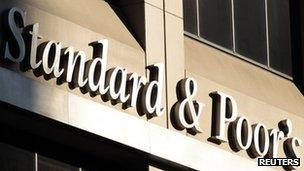France squeezed by markets
- Published
- comments

S&P announced a downgrade of French debt by mistake
It's striking that even though the ratings agency Standard & Poors last night insisted that it had not stripped France of its cherished AAA, and that a statement on its website to that effect was some kind of weird error, the price that France would have to pay to borrow for ten years has not fallen in any significant way this morning.
According to Bloomberg data, the yield on French ten-year bonds is still just under 3.5%. Now to put that into context, the equivalent UK bond yield is around 2.2% and Germany's is 1.8%. In fact, the gap between what Germany and France have to pay to borrow is now at its widest for something like 20 years.
To be clear, unlike Italy's bond yields of nearer 7%, the rise in French funding costs does not put it on the critical list.
But it's not good news for the Republic, which next year - like Italy - faces a bulge in debt falling due for repayment.
France in 2012 will have to find 281bn euros to finance maturing debt and interest. If much of that is borrowed at the higher 3.5% interest rate prevailing today, that would deprive the French government of vital money to fund public services - which is not great news just days after France announced an emergency five-year 65bn euro package of tax rises and spending cuts to reduce its public-sector deficit.
So what's going on?
Well France is the victim of two related trends: the growing risk that indebted governments of big economies, Italy and Spain, may need bailouts; and the related wariness of investors to lend to any but the strongest eurozone economies.
The point is that Italy's bond yield - the implicit interest rate it pays - is unlikely to fall decisively below the catastrophically unaffordable 7% unless and until the eurozone demonstrates that there is a bailout facility (of some sort) that has sufficient resources to lend to Italy if investors refuse to do so.
As you know, because I have been blathering on about it for ages, there is not sufficient money in the European Financial Stability Facility (EFSF) to keep Italy afloat even for a year, in circumstances where commercial creditors go on strike.
And hopes that the EFSF's firepower could be increased to a trillion euros - the bare minimum deemed necessary - took a knock yesterday when its boss, Klaus Regling, said that the current turmoil in markets was limiting the EFSF's ability to raise what's needed from its current endowment of resources.
Now those resources are commitments to the fund by solvent eurozone governments.
Here's the vicious financial logic: if the only way to take the eurozone's debt crisis down a notch or two is for the resources of the bailout fund to be increased, that would mean Germany and France making greater financial commitments to the fund.
Right now, their respective guarantee commitments are 211bn euros for Germany and 158bn euros for France - which are not trivial, even for relatively big economies.
In fact it's worse than that. If Italy were to be bailed out, its 139bn euro support for the bailout fund falls away, leaving Germany and France with an even bigger financial exposure to the fund.
So there is a clear transmission mechanism from increasing fears about the ability of Italy to repay what it owes to the perceived strength of France's balance sheet.
And today's announcement by Spain that there was no growth at all in its economy won't do anything to pull its bond yields significantly further away from that 7% danger zone, where a possible Italian bailout could be followed by a Spanish rescue.
Which is why, when I talk to bankers and investors, they regard all this fuss about whether France keeps its AAA as largely academic. For most of them, the French AAA is already - in practice if not formal reality - gone.
PS Of course, if France could persuade Germany to allow the European Central Bank to become the lender of last resort to financially overstretched countries such as Italy, the potential demands on the EFSF would at a stroke shrink - and France might, in those circumstances, be able to retain that AAA.